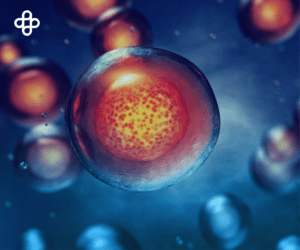Introduction
Exosomes: Tiny Messengers of Hope. Regenerative medicine has revolutionized how we approach the treatment of chronic diseases and injuries. The search for more effective and less invasive therapies has led to in-depth research on small particles known as exosomes, which have been revealed as powerful vehicles of intercellular communication and promising tools in regenerative medicine. In this article, we will explore the fascinating world of exosomes and how they are transforming the way we approach tissue regeneration and disease treatment.
What Are Exosomes?
A variety of cells in the human body and many other species secrete tiny extracellular vesicles known as exosomes. Despite their small size, ranging from 30 to 150 nanometers in diameter, these small biological messengers are loaded with information. Exosomes contain a wide range of molecules, such as proteins, RNA, lipids, and growth factors, acting as cellular messages that can be delivered to other cells. This makes them key players in intercellular communication and regenerative processes. Exosomes: Tiny Messengers of Hope
The Role of Exosomes in Regenerative Medicine
Exosomes play a crucial role in regenerative medicine due to their ability to transport biological signals that can promote the repair and regeneration of damaged tissues. Here are some ways in which researchers are using exosomes in regenerative medicine:
1. Tissue and Organ Repair
One of the most exciting uses of exosomes in regenerative medicine is their ability to stimulate tissue and organ repair. Exosomes released by stem cells, in particular, contain growth factors and RNA that can activate repair processes in recipient cells. This has led to research on their application in the treatment of muscle injuries, traumatic brain injury, heart diseases, and more.
2. Inflammation Reduction
Chronic inflammation is a contributing factor in many diseases, from autoimmune diseases to neurodegenerative disorders. Exosomes can play a significant role in regulating the inflammatory response. By delivering anti-inflammatory molecules to affected cells, they can help reduce inflammation and alleviate symptoms of various medical conditions.
3. Stimulation of Angiogenesis
Angiogenesis, or the formation of new blood vessels, is essential for tissue regeneration. Exosomes can influence angiogenesis by releasing growth factors that promote the formation of new blood vessels. This is particularly important in the treatment of cardiovascular diseases and ischemic injuries.
4. Cancer Treatment
Although it may seem counterintuitive, exosomes are also being investigated in the field of oncology. Exosomes secreted by mesenchymal stem cells have been found to have anti-tumor properties and can inhibit the growth and spread of cancer cells. This raises the possibility of using exosomes as complementary therapies in cancer treatment.
Sources of Exosomes in Regenerative Medicine
The exosomes used in regenerative medicine applications can be derived from various sources, allowing for greater versatility in research and treatment. Here are some common sources of exosomes:
1. Stem Cells
Stem cells are a rich source of exosomes with regenerative properties. In regenerative therapies, mesenchymal stem cells and embryonic stem cells, in particular, can produce exosomes.
2. Immune System Cells
Immune cells, such as macrophages and lymphocytes, also secrete exosomes that may have beneficial effects in modulating the immune response and promoting regeneration.
3. Cancer Cells
Surprisingly, cancer cells also release exosomes. Researchers are investigating these exosomes in the field of oncology. Researchers are exploring how to use exosomes in cancer treatment.
Clinical Applications of Exosomes, Tiny Messengers of Hope

Research on exosomes has advanced significantly in the last decade, and some of the most promising clinical applications include:
1. Regenerative Therapy
Medical professionals use exosomes in regenerative therapies to treat a variety of conditions, including muscle injuries, traumatic brain damage, and heart diseases. Their ability to stimulate tissue repair and regeneration makes them an attractive option for improving the quality of life for patients.
2. Treatment of Autoimmune Diseases
Exosomes can regulate the immune response and reduce inflammation, making them promising in the treatment of autoimmune diseases such as lupus and rheumatoid arthritis.
3. Cancer Therapy
In the field of oncology, researchers are investigating exosomes as a potential complementary therapy to inhibit tumor growth and enhance the response to conventional treatments such as chemotherapy.
4. Therapy for Neurodegenerative Diseases
Researchers are actively exploring the potential of exosomes to deliver neuroprotective therapies in the field of neurodegenerative diseases, such as Alzheimer’s and Parkinson’s.
Challenges and the Future of Exosomes in Regenerative Medicine
Despite the exciting advances in the application of exosomes in regenerative medicine, we must address challenges.. Some of these challenges include:
1. Standardization and Production
Producing and purifying exosomes in sufficient quantities and with the necessary quality for clinical applications is a significant challenge that we need to overcome for widespread use.
2. Regulation and Safety
Regulation of exosome-based products is an evolving area that requires clear guidelines and standards to ensure the safety and efficacy of these therapies.
3. Ongoing Research
Research on exosomes continues to evolve, and it is essential to continue exploring new applications and gaining a better understanding of their biology to harness their full potential.
Conclusion – Exosomes: Tiny Messengers of Hope

Exosomes represent an exciting frontier in regenerative medicine. These tiny extracellular vesicles are proving to be valuable tools in promoting tissue repair and regeneration, as well as in the treatment of chronic diseases. As research into exosomes advances and technical and regulatory challenges are overcome, we are likely to see significant growth in their clinical use, offering new hope to patients worldwide seeking more effective and less invasive treatments. Exosomes are undoubtedly tiny messengers of hope in the field of regenerative medicine.
Last but not least I invite you to read our article What is regenerative medicine?





